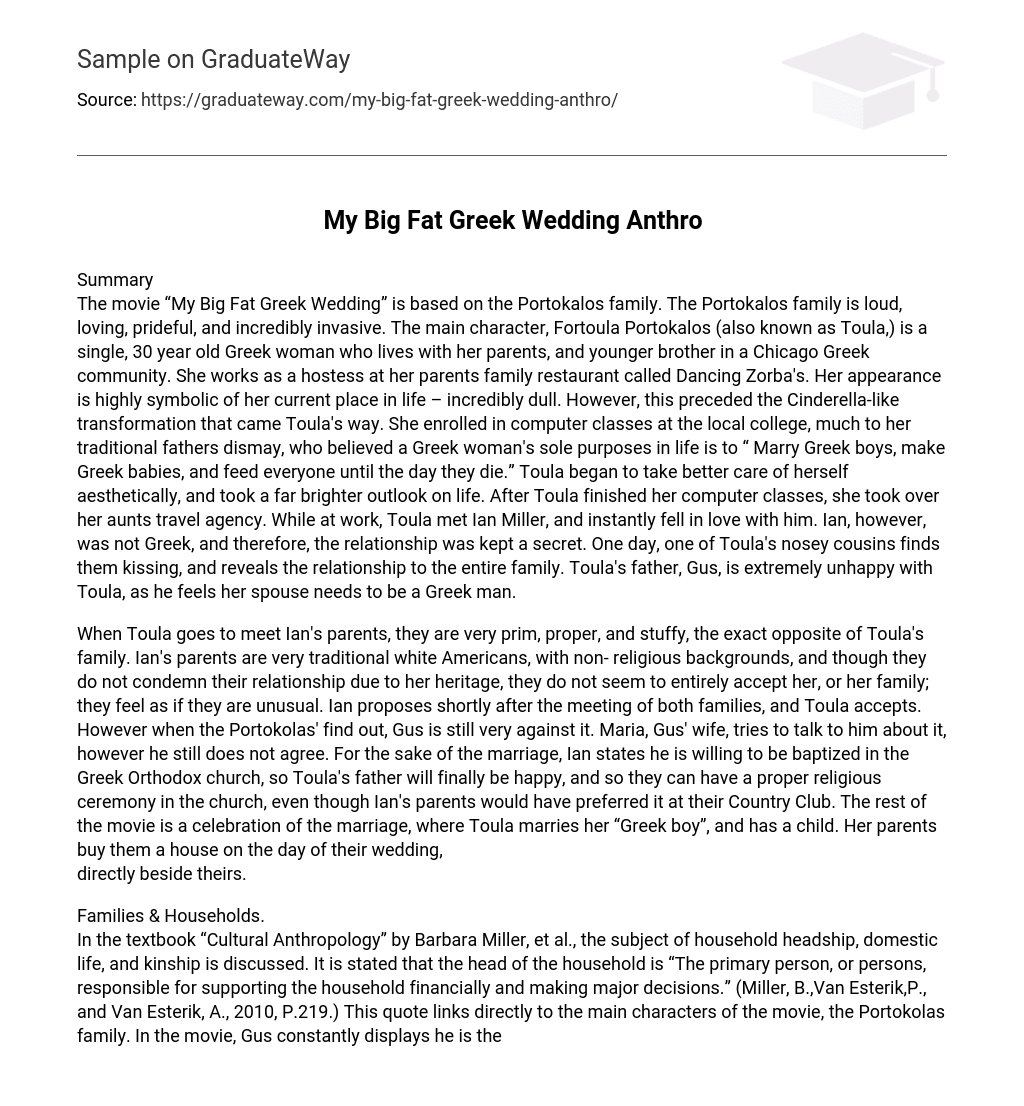Summary
The movie “My Big Fat Greek Wedding” is based on the Portokalos family. The Portokalos family is loud, loving, prideful, and incredibly invasive. The main character, Fortoula Portokalos (also known as Toula,) is a single, 30 year old Greek woman who lives with her parents, and younger brother in a Chicago Greek community. She works as a hostess at her parents family restaurant called Dancing Zorba’s. Her appearance is highly symbolic of her current place in life – incredibly dull. However, this preceded the Cinderella-like transformation that came Toula’s way. She enrolled in computer classes at the local college, much to her traditional fathers dismay, who believed a Greek woman’s sole purposes in life is to “ Marry Greek boys, make Greek babies, and feed everyone until the day they die.” Toula began to take better care of herself aesthetically, and took a far brighter outlook on life. After Toula finished her computer classes, she took over her aunts travel agency. While at work, Toula met Ian Miller, and instantly fell in love with him. Ian, however, was not Greek, and therefore, the relationship was kept a secret. One day, one of Toula’s nosey cousins finds them kissing, and reveals the relationship to the entire family. Toula’s father, Gus, is extremely unhappy with Toula, as he feels her spouse needs to be a Greek man.
When Toula goes to meet Ian’s parents, they are very prim, proper, and stuffy, the exact opposite of Toula’s family. Ian’s parents are very traditional white Americans, with non- religious backgrounds, and though they do not condemn their relationship due to her heritage, they do not seem to entirely accept her, or her family; they feel as if they are unusual. Ian proposes shortly after the meeting of both families, and Toula accepts. However when the Portokolas’ find out, Gus is still very against it. Maria, Gus’ wife, tries to talk to him about it, however he still does not agree. For the sake of the marriage, Ian states he is willing to be baptized in the Greek Orthodox church, so Toula’s father will finally be happy, and so they can have a proper religious ceremony in the church, even though Ian’s parents would have preferred it at their Country Club. The rest of the movie is a celebration of the marriage, where Toula marries her “Greek boy”, and has a child. Her parents buy them a house on the day of their wedding,
directly beside theirs.
Families & Households.
In the textbook “Cultural Anthropology” by Barbara Miller, et al., the subject of household headship, domestic life, and kinship is discussed. It is stated that the head of the household is “The primary person, or persons, responsible for supporting the household financially and making major decisions.” (Miller, B.,Van Esterik,P., and Van Esterik, A., 2010, P.219.) This quote links directly to the main characters of the movie, the Portokolas family. In the movie, Gus constantly displays he is the head of the family, whether it be through major decisions needing to be run through him, being financial or domestic, as well as Toula’s choice in men. When Toula brings home Ian for the first time, Gus is angered that he was not asked, nor consulted with, for the relationship. According to the textbook, European Colonialism spread the concept, along with laws and rules, that it is the male who takes on the leadership role of the family. With the Portokolas family being Greek, it shows traditional European values within the home (Miller, B.,Van Esterik,P., and Van Esterik, A., 2010, P.219.). It seems rather outdated through a Western perspective that Gus feels the way he does about the role in the household; for example, when Toula told her parents she was going to enrol in college, Maria was overjoyed, but Gus was not impressed with her decision. He stated she should forgo school, and instead get married, and have children. In his opinion, women are to take care of the household and stay close to their maternal nature.
In Ian’s family, the atmosphere is entirely different. Ian’s family is Caucasian-American, and both of his parents are lawyers. Through the textbook does not have much information on shared household headship, it does state that “Filipina women play a prominent role in income generation and budgetary control, and both partners share decision making. Thus, co-headship would be a more appropriate label.” (Miller, B.,Van Esterik,P., and Van Esterik, A., 2010, P.219.) Therefore, it seems as if many of today’s American’s fit in with the Fillipino mindset of household equality. It also appears, through previous class discussions, that a “Co-headship” is a more modern, westernized approach to home life.
In the section of the textbook that explains Kinship, it is stated that “Depending on the cultural context, various kinds of kinship systems shape children’s personality development, influence marriage options, and affect the care of the aged.” (Miller, B.,Van Esterik,P., and Van Esterik, A., 2010, P.202.) In response to the raising of a child effecting marriage options, it is entirely displayed in the movie with the Portokolos family. Toula was raised to be well aware that she was to date a man of Greek descent. The entire family (including far extended relatives,) are Greek. Throughout the entire Portokolos genealogy, everyone is of Greek culture, and they intended to keep it that way. Gus went so far as to arrange dates of prospective men for Toula to wed, even after Ian was introduced. The Kinship group will perform the task of ensuring continuity of the family through arranging marriages.





